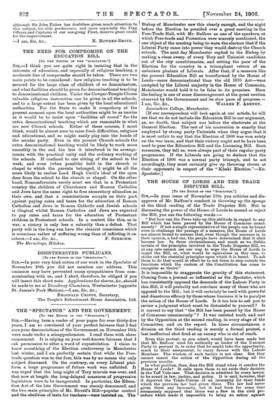THE "SPECTATOR" AND THE GOVERNMENT. [To THE EDITOR OF THE
"SPECTATOR."] Sin.,—Having been a reader of your paper for over thirty-five years, I am so convinced of your perfect fairness that I feel sure your denunciations of the Government on November 10th were made under a misapprehension. I read them with sheer amazement. It is relying on your well-known fairness that I ask permission to utter a word of expostulation. I claim to know something of the Election controversy in Manchester last winter, and I am perfectly certain that while the Free- trade question was to the fore, this was by no means the only subject discussed. On the contrary, on every Liberal plat- form a large programme of future work was unfolded. It was urged that the long night of Tory misrule was over, and that now at length the long-delayed measures of progressive legislation were to be inaugurated. In particular, the Educe- tion Act of the late Government was sternly denounced, and the two main principles of Mr. Birrell's Bill—popular control and the abolition of tests for teachers—were insisted on. The Bishop of Manchester saw this clearly enough, and the night before the Election he presided over a great meeting in the Free-Trade Hall, with Mr. Balfour as one of the speaker!, at which Free-trade and Protection were scarcely mentioned, the one object of the meeting being to warn the electors that if the Liberal Party came into power they would destroy the Church schools. The next day Manchester replied to the Bishop by making a clean sweep of every Tory and Unionist candidate out of the city constituencies, and setting the pace of the Election for the country in a triumphant return of an unbroken phalanx of Liberals. After that, if a measure like the present Education Bill as transformed by the House of Lords—more denominational than the old 1870 Act—were accepted by the Liberal majority in the House of Commons, Manchester would hold it to be false to its promises. Here the feeling is one of some discouragement at the great caution observed by the Government and its slow pace of progress.— I am, Sir, &c., WALKER. F. ADENEY. Lancashire College, Manchester.
[If our correspondent will look again at our article, he will see that we do not include the Education Bill in our argument, as, no doubt, that subject was before the electorate at the General Election. The rest of his contention is exactly that employed by strong party Unionists when they argue that it is most unfair to say that"the Election of 1900 was won solely on the war issue, and that their victory ought not to have been used to pass the Education Bill and the Licensing Bill. Such measures, they tell us, were always part of their regular party programme. If the Liberals are going to declare that the Election of 1906 was a normal party triumph, and to act accordingly, they must certainly give up throwing stones at their opponents in respect of the "Khaki Election."—En. Spectator.]














































 Previous page
Previous page